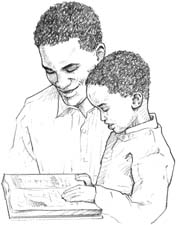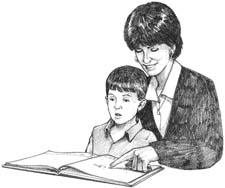 You can be the key to
your child's success
You can be the key to
your child's success
with literacy. As his or her first teacher, you are in a
unique position to help instill a love of reading in your child.
Read aloud to your child.
Choose material(books, magazines, comics) based on topics your child
finds interesting. Ask your child questions about what has just been read.
(The Who, What, Where, When and Why of a story.)
 Create
an alphabet of pictures. Create
an alphabet of pictures.
Choose a sound and ask your child to cut out pictures of things that
begin with that sound. Have your child glue their picture onto an index card
and write the letter that makes that sound. Use these cards to review
sounds.
Surround your children with reading material.
Children with a large supply of reading materials in their homes are
known to score higher on standardized tests.
Encourage a wide variety of reading
activities.
Make reading an important part of your child's life. Have them read
menus, grocery lists, roads signs, game directions, the comics, or movie
time listings.
Be knowledgeable about your children's
progress.
Find out what reading skills your child is expected to have at each
grade level. The school's curriculum will give you this information.
Get help promptly for reading problems.
Reading problems do not magically disappear with time. The earlier
children receive help, the more likely they will become good readers.
Let your child gradually share some of the
reading aloud.
You read a sentence, paragraph, or page, then it's your child's turn.
Take over if your child seems tired or discouraged. Keep reading a fun
thing, not just hard work.
Leave notes in a lunch bag or on the
refrigerator for your child to discover and read.
Make it simple, using words your child knows or you think they can
sound out.
Take your new reader to the library.
Pick up a library card and make a big deal about it. Let your child
know how important and special books can be.

*Please spend 10 to
15 minutes reading with your child each night.*
What if my child
comes to a word he/she doesn't know?
1. Have your child
find part of the word he/she knows.
2. Ask your child to
use any picture clues that might help to figure out the word.
3. Read through the
rest of the sentence and then go back to the word.
4. Cover up part of
the word to break the word apart.

|